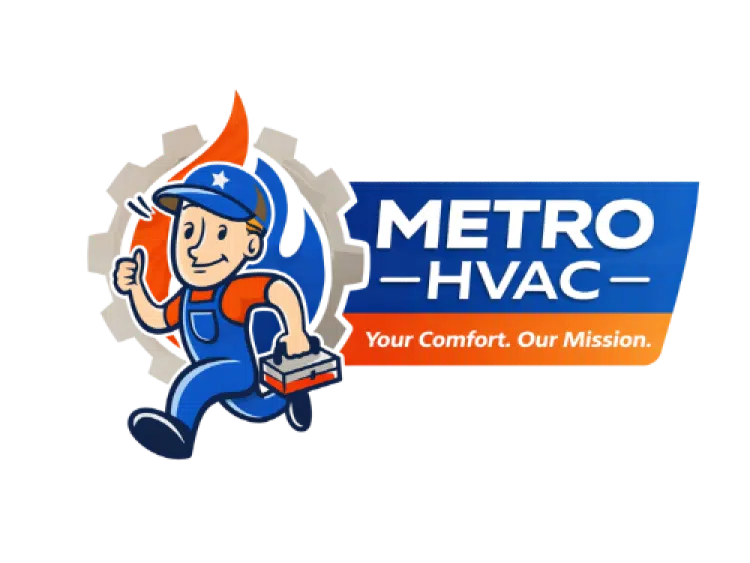Winter’s almost over, and that means it’s time to give your HVAC system some love. Your HVAC filter is key to keeping your home’s air clean and your system running smoothly. If you’ve been wondering how often to change an HVAC filter or how often to service an HVAC, Metropolitan HVAC has got you covered!
Understanding Different HVAC Systems
Not all HVAC systems are the same, and the type you have can impact how often you need to replace your filter and what kind you should use. Let’s break it down
- Furnaces – These systems use fuel (natural gas, oil, or electricity) to heat air, which is then distributed throughout the home via ductwork. Since furnaces run frequently during the winter, their filters can accumulate dust and debris quickly. Regular filter changes, preferably every 1-2 months during peak use, help maintain efficiency and prevent overheating.
- Central Air Conditioners – These systems work by pulling in warm air, cooling it via a refrigerant, and then circulating it back into the home. The filter prevents dust and debris from clogging the cooling coils, which can lead to reduced efficiency or even system failure. Changing the filter regularly helps maintain proper airflow and keeps the AC running smoothly.
- Heat Pumps – Unlike furnaces and AC units that only work seasonally, heat pumps provide both heating and cooling year-round by transferring heat rather than generating it. Because they operate constantly, their filters tend to get dirty more quickly and should be checked every month and replaced at least every 1-2 months.
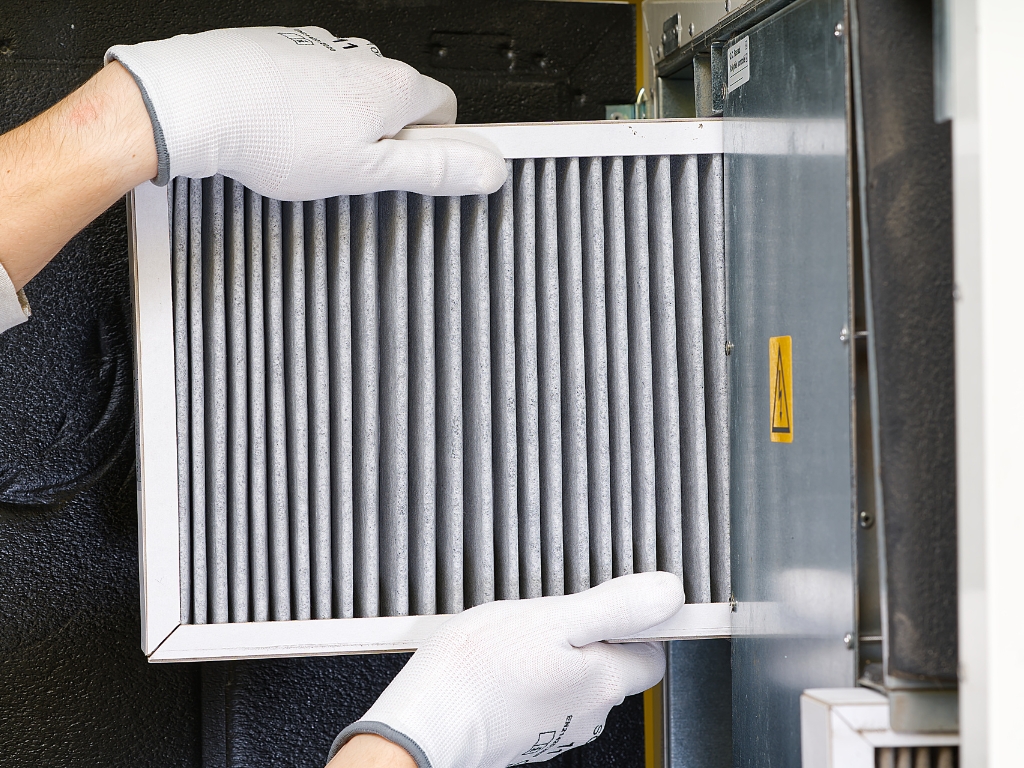
- Ductless Mini-Split Systems – These systems don’t rely on ducts but instead have individual air handlers in different rooms. Each indoor unit has its small filter that must be cleaned or replaced regularly to prevent dust buildup and maintain efficiency. Unlike central systems, ductless mini-split filters are often washable and should be cleaned every few weeks.
- Hybrid Systems – These advanced systems combine a traditional furnace with a heat pump to optimize efficiency, automatically switching between gas and electric heating depending on the temperature. Since both components rely on filtration to keep airflow smooth and components clean, filters should be checked and changed regularly.
Choosing the right filter type for your specific HVAC system is crucial for maintaining efficiency and preventing issues. Whether you have a furnace, heat pump, or ductless system, keeping your filters clean ensures better air quality and system longevity.
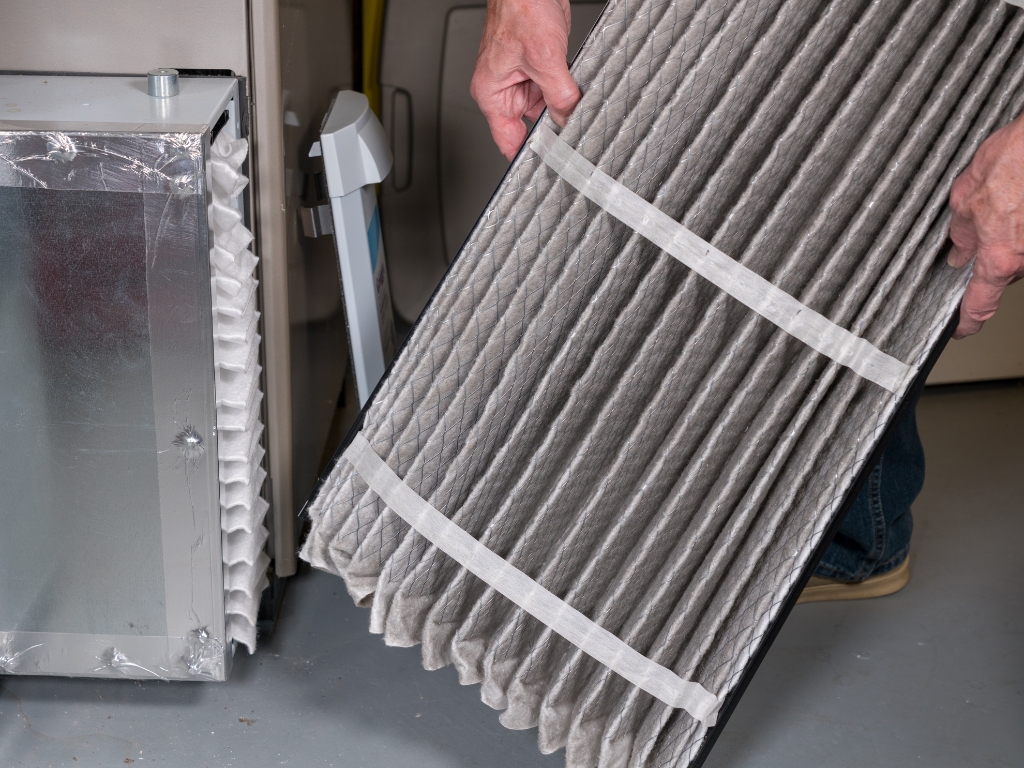
Why You Need to Replace Your HVAC Filter
Not all HVAC systems are the same, and the type you have can impact how often you need to replace your filter and what kind you should use. Let’s break it down
- Furnaces – These systems use fuel (natural gas, oil, or electricity) to heat air, which is then distributed throughout the home via ductwork. Since furnaces run frequently during the winter, their filters can accumulate dust and debris quickly. Regular filter changes, preferably every 1-2 months during peak use, help maintain efficiency and prevent overheating.
- Central Air Conditioners – These systems work by pulling in warm air, cooling it via a refrigerant, and then circulating it back into the home. The filter prevents dust and debris from clogging the cooling coils, which can lead to reduced efficiency or even system failure. Changing the filter regularly helps maintain proper airflow and keeps the AC running smoothly.
- Heat Pumps – Unlike furnaces and AC units that only work seasonally, heat pumps provide both heating and cooling year-round by transferring heat rather than generating it. Because they operate constantly, their filters tend to get dirty more quickly and should be checked every month and replaced at least every 1-2 months.
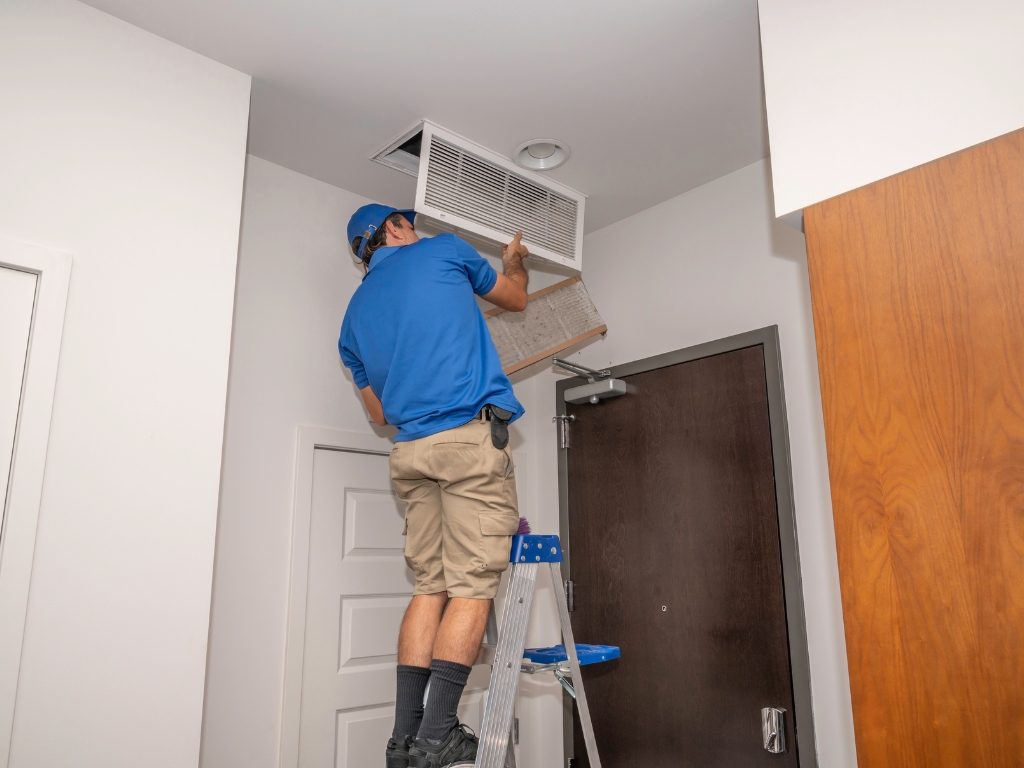
Common Issues Caused by Dirty HVAC Filters
Neglecting to replace your filter can lead to a variety of problems:
- Reduced Airflow – A clogged filter makes it harder for air to circulate, causing uneven temperatures and poor performance.
- Higher Energy Bills – When your system works harder to push air through a dirty filter, it uses more energy.
- Overheating or Freezing Up – In heating mode, restricted airflow can cause overheating, while in cooling mode, it can lead to frozen coils.
- Increased Allergies and Respiratory Issues – Dirty filters don’t trap contaminants effectively, leading to poorer indoor air quality.
- Shortened System Lifespan – Excessive strain on your HVAC system can lead to premature wear and tear.
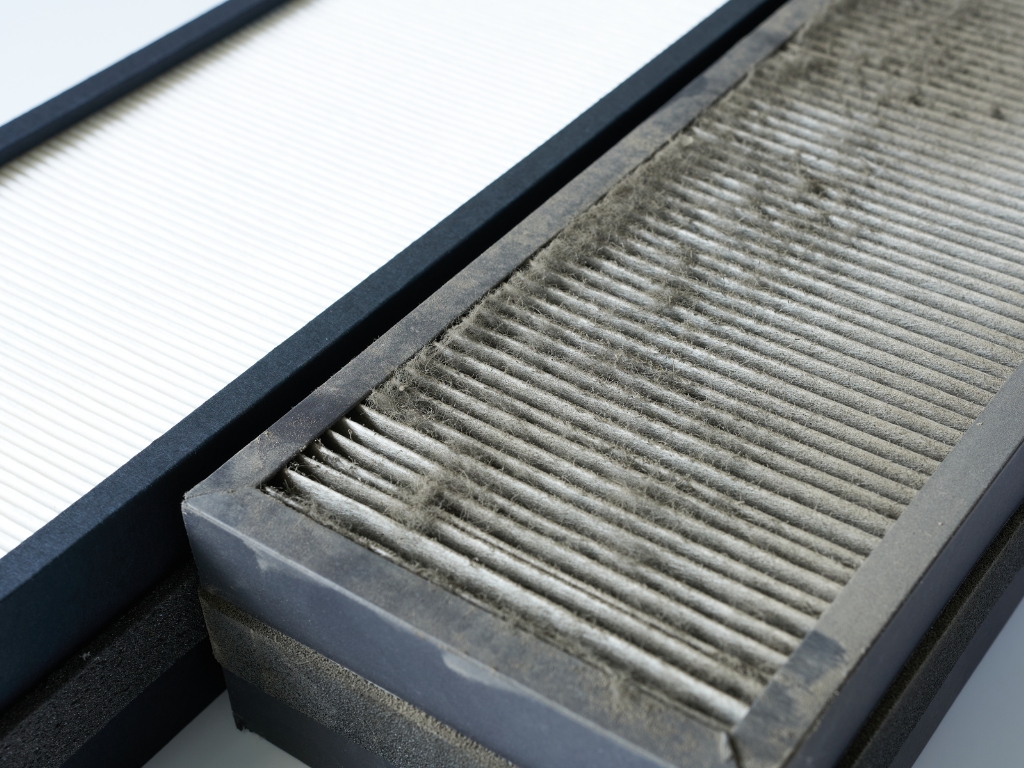
Comprehensive HVAC Filter Replacement Guide—By Metropolitan HVAC
To keep your system running efficiently, follow these guidelines:
- How Often Should You Change Your HVAC Filter?
- Every 1-2 months if you have pets or allergies.
- Every 3 months for standard households.
- Monthly checks during peak heating and cooling seasons.
- Choosing the Right HVAC Filter
- Fiberglass Filters – Inexpensive but need frequent replacement.
- Pleated Filters – More efficient at trapping particles, lasting up to three months.
- Electrostatic Filters – Use static charge to trap pollutants; reusable options available.
- HEPA Filters – Ideal for allergy sufferers, capturing even the smallest particles.
- Carbon Filters – Help remove odors and improve air quality.
- Signs You Need to Replace Your Filter Sooner
- Dust is accumulating quickly in your home.
- Increased allergy symptoms.
- Your system is running longer than usual.
- Higher energy bills.
Next Steps: HVAC Maintenance and Seasonal Prep
Maintaining your HVAC system is about more than just changing the filter. Here are additional steps to keep it running efficiently:
- Schedule a Professional Inspection – Twice-a-year maintenance visits (spring and fall) help catch small issues before they become major problems.
- Clean Your Vents and Ducts – Dust buildup in your home’s vents and ducts can contribute to poor air quality and force your system to work harder.
- Check Your Thermostat Settings – As the weather warms up, adjust your thermostat to an energy-efficient setting to prevent overuse.
- Inspect Your Outdoor Unit – If you have a central AC or heat pump, clear away debris like leaves and dirt that may have accumulated around the unit.
- Seal Any Air Leaks – Check windows and doors for drafts that can make your HVAC system work harder than necessary.
- Consider an Air Purifier – If you suffer from allergies, an air purifier can work alongside your HVAC filter to improve indoor air quality.
- Stock Up on Filters – Keep a few extra filters on hand so you’re always prepared for quick replacements.
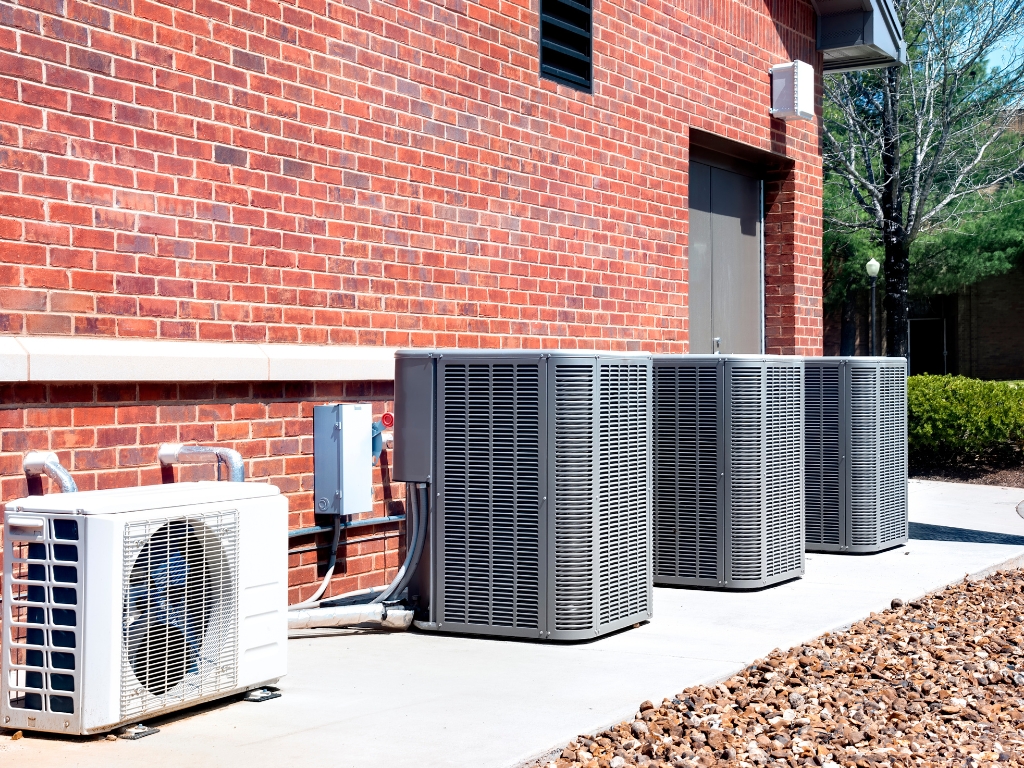
Is It Okay to Run My AC Without a Filter?
Technically, yes—but it’s a bad idea! Without a filter, dust and debris can clog your system, reducing efficiency and potentially causing damage. Avoid unnecessary HVAC filter replacement costs by keeping your filter clean and in place.
HVAC Filter Replacement Cost
A standard HVAC filter can cost between $10 and $50, depending on the type and brand. High-quality filters that help with allergies or odors might cost more but offer extra benefits.
HVAC Filter Drier Replacement Cost
If you ever need a filter drier replacement, expect to pay between $100 and $400, including parts and labor. Regular maintenance can help prevent these costly repairs!

Get Your HVAC Ready for Spring!
- Swap out your HVAC filter to keep the air clean and your system running smoothly.
- Book a professional HVAC tune-up to catch any potential issues.
- Keep an eye on air quality and adjust filter changes as needed.
A little HVAC care now means a more comfortable home, lower energy bills, and a system that lasts longer. Ready to get started? Contact us to schedule your seasonal maintenance today!
